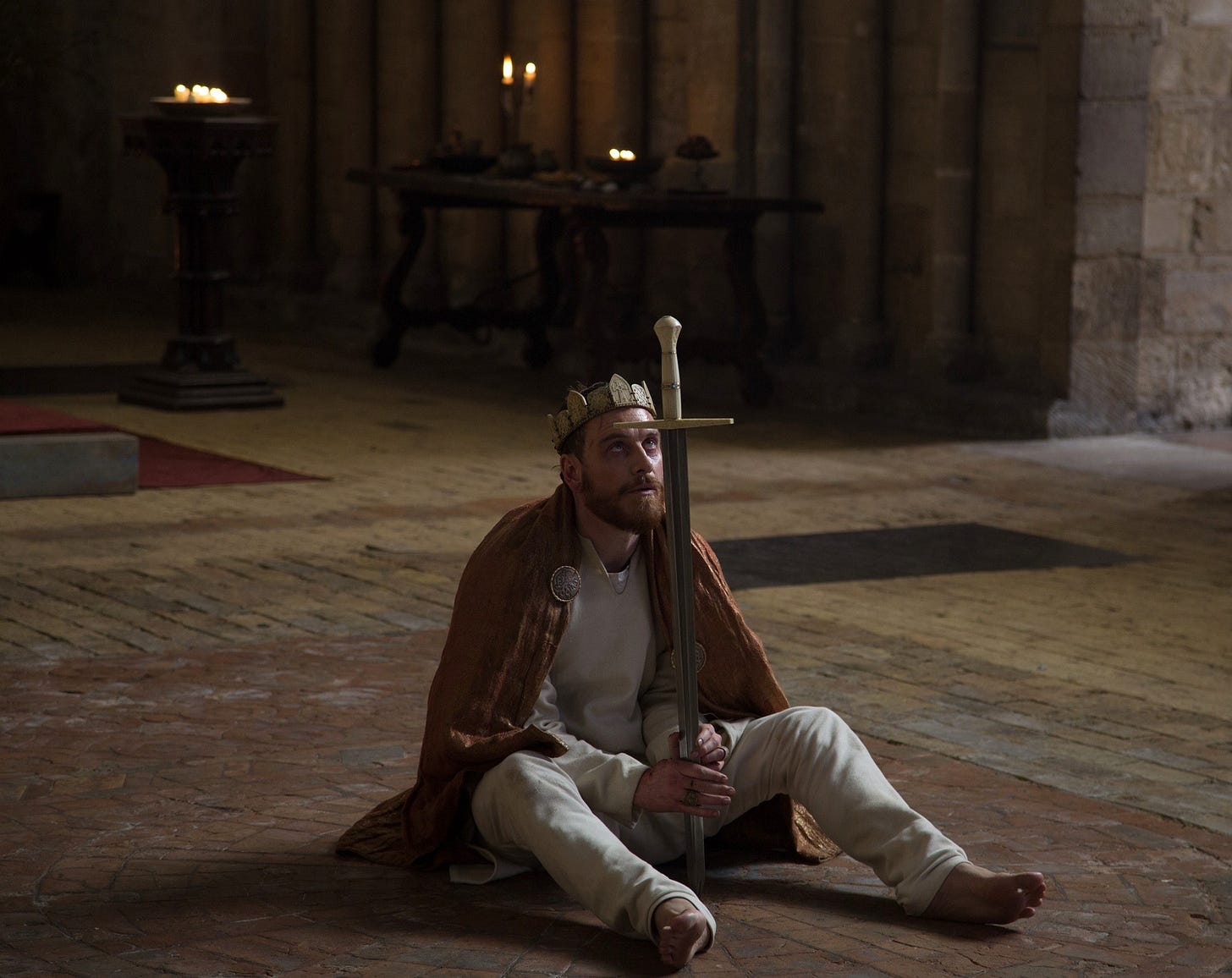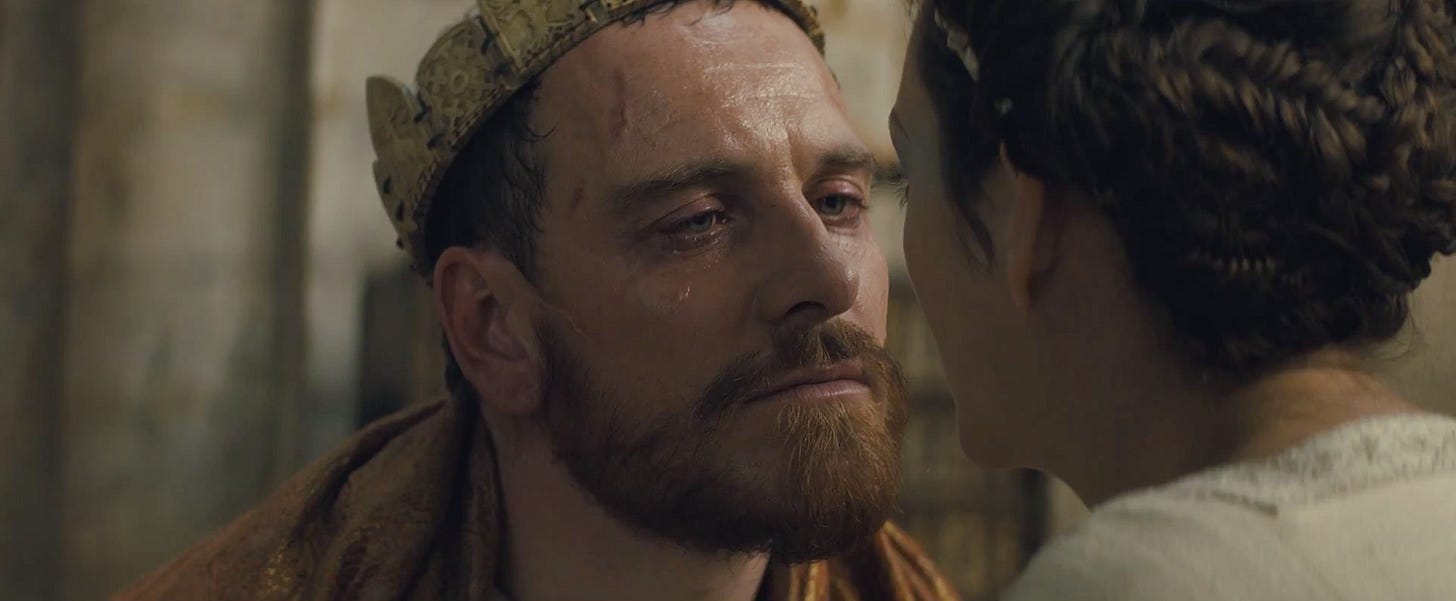Beastly Reviews: Macbeth
A sexy "Macbeth" that proves some plays belong onstage.
I’m Alexander Cheves, and this is LOVE, BEASTLY—a blog about sex, feelings, and manhood. It’s written mostly for men—gay, straight, bi, MSM, or just curious—but some readers are women, and some don’t fit into categories. Everyone’s welcome here.
This is Beastly Reviews, where I write about films that made me feel something.
These posts are free to read. Subscribe to unlock essays, advice, and more personal work.
Justin Kurzil's grim, gorgeous Macbeth—an art movie among the holiday crowd—brings Shakespeare's tragedy to the big screen in a new, sexy, and stylish way.
Macbeth gives the done-so-many-times play the once-over with all the violence and grit it deserves and places the difficult iambic pentameter in a creepy, misty atmosphere that looks, I guess, like the Scottish highlands.
I think it is probably best seen if you are a little familiar with the play. I've read it. I've done a literary analysis of it. But that's because I'm a literature student, and most movie-goers aren't. Will anyone care about it? No, probably not.
The opening battle sequence feels like a Woodkid music video. When the three witches appear, they are creepy in a Ryan Murphy-ish way: off-kilter and odd but not scary. Standing in a row, staring blankly at the camera, they are a toned-down version of the traditional "three witches" archetype, one we’re all familiar with—three hags cackling around a cauldron—and feel nicely modern.
But why Shakespeare? Why Macbeth? Why this, again?
Beyond its grim look, the film's only commentary, really, is on itself. It's a big risk, a big ask of modern audiences, and a bit too arty. Watching it, I'm aware this film is made for a certain crowd, the sort of people willing to sit through Macbeth on the big screen. But is that enough?
It just takes itself a little seriously. It is so out of place among other films as to appear awkward. Among the current movie posters lit in their displays, "coming soon" and "now playing,” one is an Old English play that was first written in 1606.
There is a valid question of whether or not these old plays should be put on the screen at all—whether or not they belong there. Shakespeare wrote plays for the stage, typically theatres in the round, which required a different kind of acting than is needed in modern cinema. I'm just not convinced it works. I felt the same about Baz Luhrmann's iconic 1996 Romeo and Juliet, another Shakespeare movie that sustains itself solely on its stylistic novelty.
Most audiences will be lost. And the effect of that—making a movie that will confuse most viewers—is perhaps meant to be erudite and intellectual, but I’m not sure if it’s actually a little off-putting. The language of Shakespeare was made in and for a different world, when English, even that spoken by the common man, was vastly different from what it is now. For those who study and appreciate theatre, Shakespeare is timeless, but I don't know if cinema is where we want to enjoy it. It wants to live in an old playhouse and be seen live. I want to see Shakespeare onstage.
Macbeth is lush but cumbersome, gorgeous yet trudging, and that's largely due to the fact that it is, in fact, Shakespeare onscreen. Watching the film is a sort of intellectual commitment, something viewers will feel smart for having done, regardless of whether they actually enjoy doing it.
Fassbender got beefed up for the role, so this King Macbeth is super hot. In the film, he descends into madness in Fassbender style, half-lidded, intense and cold-looking, drenched in sweat. Marion Cotillard has proven her ability to do sinister characters well in past films and does so again with her ice-blooded, wan-looking Lady Macbeth.
But in a play about transformation—and yes, this is teetering into literary analysis—they change very little. Macbeth is stern, taciturn, and grim at the beginning and stern, taciturn, and grim at the end, but we're to understand that he's crazy now. The same issue plagues Cotillard, but that's more true to her character: Lady Macbeth is always crazy, the bad apple that first proposes killing King Duncan and starting the couple's dark descent. They are both grim and intense actors. One gets the sense they did not really know what to do.
Macbeth is so heavy-handed, so packaged, but since it is, actually, deeply constrained by its source material, it never really gives us space to ask the larger questions that its source material provokes. Does Macbeth turn evil as a result of his greed, or is he a pawn in a grander prophecy? Is he responsible for his actions? Live plays do not have the ability to comment on themselves, but film does, and in a movie, modern audiences want more than the basic elements of script and set. In other words, we want more than a play: we want a perspective.
That is, in a way, the problem with Angels in America and all movies and TV shows that are just filmed plays. Film has the unique ability to comment on itself, to explore difficult philosophical questions through the very language and vehicle of filmmaking. Which makes a filmed play—something that works onstage—fall a little flat on the big screen, like videorecording a live performance. This is why I think plays and films don't work when switched. Plays are for the stage, films are films.
But I forget myself: these are the ramblings of a literature student, the sort of person who goes to see Macbeth on the big screen. And I sure did. You should, too.
Love, Beastly



